The Philippines. Taking Different Paths.
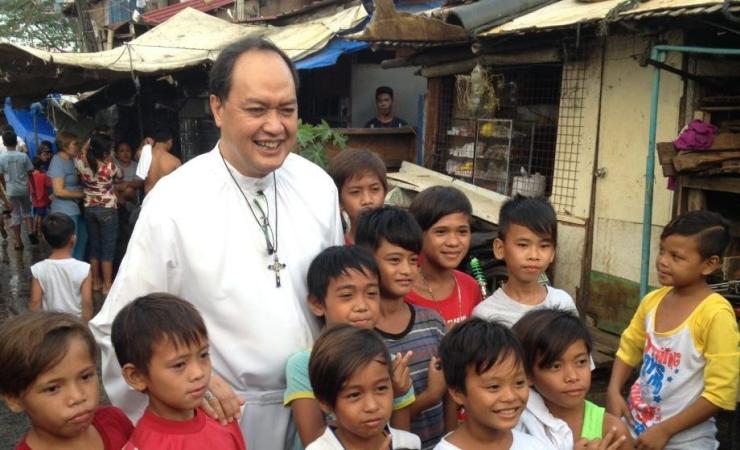
The many challenges of Monsignor Pablo Virgilio David, bishop of the diocese of Kalookan, on the outskirts of Manila, and also president of the Philippine Bishops’ Conference.
His pastoral and charitable commitment led him to take sides against all forms of injustice and violence to the extent that, during the presidency of Rodrigo Duterte, he was accused of sedition and threatened with death, for having denounced violations of human rights and extra-judicial executions. He says: “I denounced the fact that the so-called war against drug traffickers was immoral, illegal, and essentially against the poor. The government must fight crime, but it cannot do it
with arbitrary and violent methods leading to Caloocan the systematic
killing of alleged criminals”.
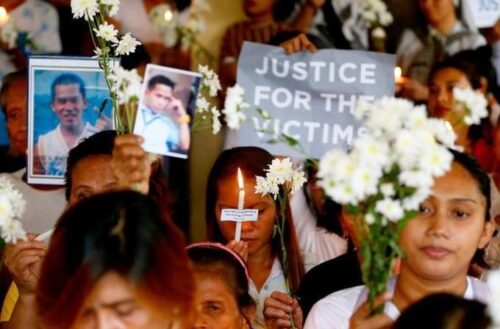
Mons. David: “I denounced the fact that the so-called war against drug traffickers was immoral, illegal and essentially against the poor.”
He continues: “I supported the efforts of courageous journalists who irrefutably documented the abuses. Many of the people killed were not armed and did not resist the intervention of the police. After our complaints, they changed tactics: the executions were no longer carried out by uniformed policemen but by masked vigilantes and were classified as ‘cases under investigation’, but in reality, then, there was no investigation. The government officially declares six thousand ‘victims of the war on drugs’. But there are many more: we think that the people killed by the vigilantes, and not declared by the government, number more than twenty thousand”.
Faced with these complaints, the bishop has met with accusations and intimidation. “I received five charges of sedition and other trumped-up charges from the National Police, based on the testimony of an unknown person. They had a clear intimidating purpose. I was defended by my lawyer brother. Three other bishops were charged, but then the charges were dropped by the prosecutor before going to court”.
Creating communities
Monsignor Pablo Virgilio David, 62, was born in Betis in the province of Pampanga. He studied in Manila, Louvain, and Jerusalem, and taught biblical theology. In 2006 he became auxiliary bishop of San Fernando and since 2016 he has been bishop of Kalookan. Since 2021 he has been president of the Philippine Bishops’ Conference.
The diocese of Kalookan is located on the outskirts of the metropolitan area of Manila, an area where many people live on the margins of society. Speaking of his diocese, he says:
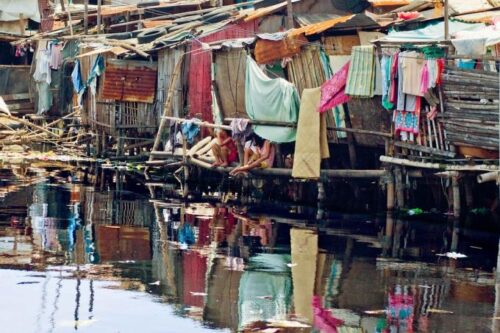
Slums on the outskirts of Manila. “Give what you can, take what you need”. Photo 123rf
“The diocese of Kalookan has 1 million 800 thousand inhabitants, of whom almost 90% are Catholics. Only 10% are reached by our parishes. When I became bishop, I immediately looked for those who remained on the margins of traditional pastoral care. Most of them are people from other provinces who don’t even have a residence. They live in slums, without adequate services and housing. I was shocked to learn that many children don’t even have birth certificates. For the state, they do not exist, and they do not go to school or hospital. Babies born at home are not registered to avoid paying the certificate fee, albeit minimal. The consequences are terrible. I have tasked a nun to work full-time and go out of her way to register the undocumented children of the diocese”.
“One of my priorities is to create ‘mission stations’ – continues the bishop – Today we have 18 and about 120 leaders between lay people, religious and priests. We are creating grassroots communities that are more agile and open than traditional parishes. In any case, we do not have the land, the resources, or the staff. The laity and nuns can be excellent leaders. There are also 35 diocesan priests”.
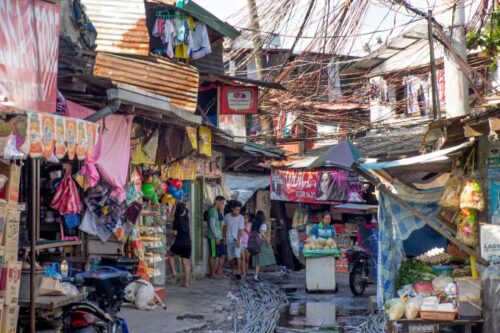
The local street in a small Philippine town. Photo: 123rf
The Coronavirus pandemic has had a heavy impact on the country. Many families have been affected. Mons. David had a brother of his who died of Covid. “A tragedy for my family: he was cremated within 24 hours; we weren’t even able to celebrate the funeral. And it was the same for many other families. The economic impact has also been dramatic. During the lockdown, there were people on the verge of starvation. Government aid has not been timely. But there have also been very consoling and effective acts of solidarity. For example, the ‘community food banks’ were started, i.e., public tables where people bring what they can and take only what they need, especially food. The initiative arose spontaneously, and the Church made it her own, extending it to the whole country. I think of it as the miracle of the multiplication of loaves and fishes. A slogan that has become popular goes: ‘Give what you can, take what you need’”.
However, the churches were closed. “We didn’t want to do it, but the government imposed it. We have strengthened the social communications service, thanks to the help of many young volunteers and digital technology experts. We stood by people with online meetings and celebrations. We have thus reached people who did not attend church and now do. Furthermore, despite the difficulties, we have not fired anyone who works in our facilities”.
The document of Bangkok
Looking at his commitment as president of the episcopal conference of the Philippines which has a current structure of 16 archdioceses, 74 dioceses, 7 apostolic vicariates, 4 territorial prelatures, and a military ordinariate. “It is a role that promotes the collegiality affirmed by the Council. It’s a challenge. It is not easy to build consensus: we Filipino bishops come from very different contexts which lead to different points of view. There is a need for a lot of interaction and commitment to converge on common pastoral positions that meet today’s challenges. In particular, the first is to combine faith with social, political life and ethical choices. Catholics, for example, see no connection between faith and political choices. They experience them as two parallel things. This is a defeat. We must encourage the laity to engage in politics starting from their faith. We bishops have a spiritual and moral role, but the commitment to politics belongs to the laity”.
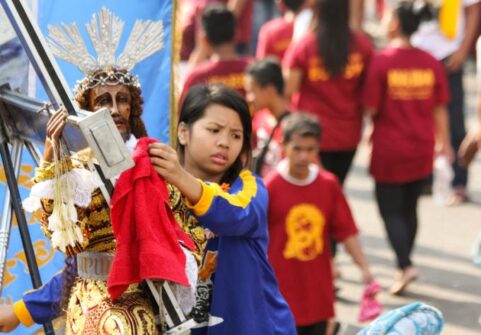
123rf
“We must humbly admit – says the bishop – that many faithful do not make choices based on what they have learned in church. This may be because we are absolutely unable to offer valid pastoral care to everyone. At best we reach 20% of Catholics. And so, it is already a huge challenge. Our priests can do no more. The Philippines is a country with a Catholic majority, the churches are always full and the Masses numerous. Yet the majority of Catholics do not participate in any way in ecclesial and social life”.
Last October, the assembly of bishops was held in Bangkok, Thailand, to celebrate the 50th anniversary of the Federation of Asian Bishops’ Conferences (FABC). The Assembly gave rise to the ‘Bangkok Document’ which, for the Burmese cardinal, Charles Bo, president of the FABC, constitutes “the watershed for the progress of the churches in Asia”.
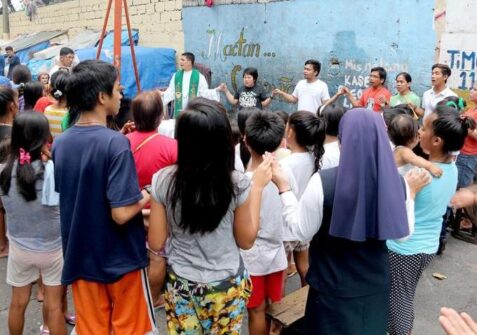
Archbishop David was among the protagonists of the Assembly. He tells us: “It is an important document: it celebrates the 50th anniversary of the FABC and outlines its future lines. We have chosen an evangelical icon: the story of the Magi for the five sections. In the first, entitled ‘Observe’ and inspired by the Magi who scan the stars, we describe the realities of Asia, especially those of the poor, young people, and women. The second, ‘Walking Together’, refers to the journey of the Magi who leave their safety zone to follow a goal. We ask ourselves: which common path? The third, ‘Discernment’, refers to the reaction against the words of Herod and the high priests. We bishops also have to deal with political and religious authorities, and we must practice discernment. The fourth is ‘Offering one’s gifts’. Finally, ‘New paths’: like the Magi, blocked by Herod, the Churches of Asia are also called to take new paths to respond to new obstacles and challenges”.(Photo: Monsignor Pablo Virgilio David, bishop of the diocese of Kalookan, on the outskirts of Manila with children of the slam.)
Gianni Criveller/MM



